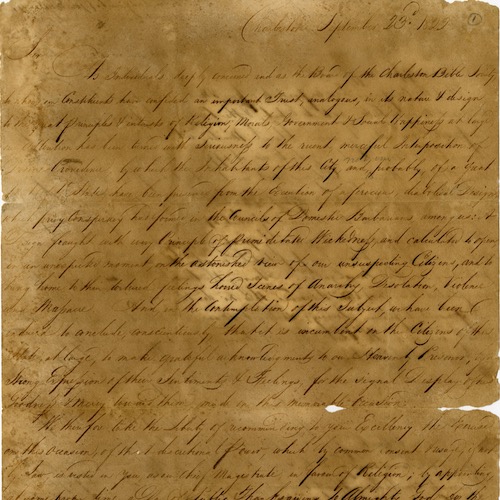About the Collection
The Manigault Family Papers, 1685-1971, collection contains a bound volume kept by Charles Izard Manigault, (1795-1874).
The Manigault family was established in South Carolina by Huguenot immigrants, Pierre and Judith Manigault who settled in the French Santee area of South Carolina. The couple gave birth to a son, Gabriel Manigault (1704-1781), who became the wealthiest merchant and banker in the Carolinas. He married Ann Ashby (1705-1782), and they had a son, Peter Manigault (1731-1773) who is regarded as the wealthiest man in the colonies and who owned hundreds of enslaved persons, maintained numerous plantations, and served in the South Carolina House of Commons. In 1775, Peter Manigault married Elizabeth Wragg, daughter of Joseph Wragg, the largest slave trader in North America. Together, the couple had four children: Gabriel Manigault (1758-1809), Anne Manigault Middleton (1762-1811), Joseph Manigault (1763-1843) and Henrietta Manigault Heyward (1769-1827).
Charles Izard Manigault was one of ten children belonging to Gabriel Manigault and Margaret Izard (1768-1824). The Charles Manigault Letter Book, 1846-1848, documents the plethora of letters sent by Charles while living in Paris, France with his family between 1846-1848. Letters were sent to James Coward, overseer at Silk Hope Plantation in Berkeley County, South Carolina, Thomas Middleton, R. Habersham & Son, Alfred Huger, Anthony Barclay, Y. Haynes, overseer at Gowrie Plantation in Chatham County, Georgia, and his sons Louis Manigault and Charles Manigault Jr. Topics discussed in these letters include business operations at Silk Hope and Gowrie Plantations, treatment and punishment of enslaved people, a group of slaves, comprised primarily of women slaves, taking an overseer to court, living abroad in Paris and adhering to a Parisian lifestyle, Charles Manigault’s views on racial equality in Paris, the Manigault children’s schooling in Paris and at Yale College, traveling Europe, meeting Muhammad Ali, the leader of Egypt and discussing the Mexican-American War and Egyptian politics, Charles Manigault’s Huguenot ancestry and history, and being in Paris witnessing the French Revolution of 1848.




